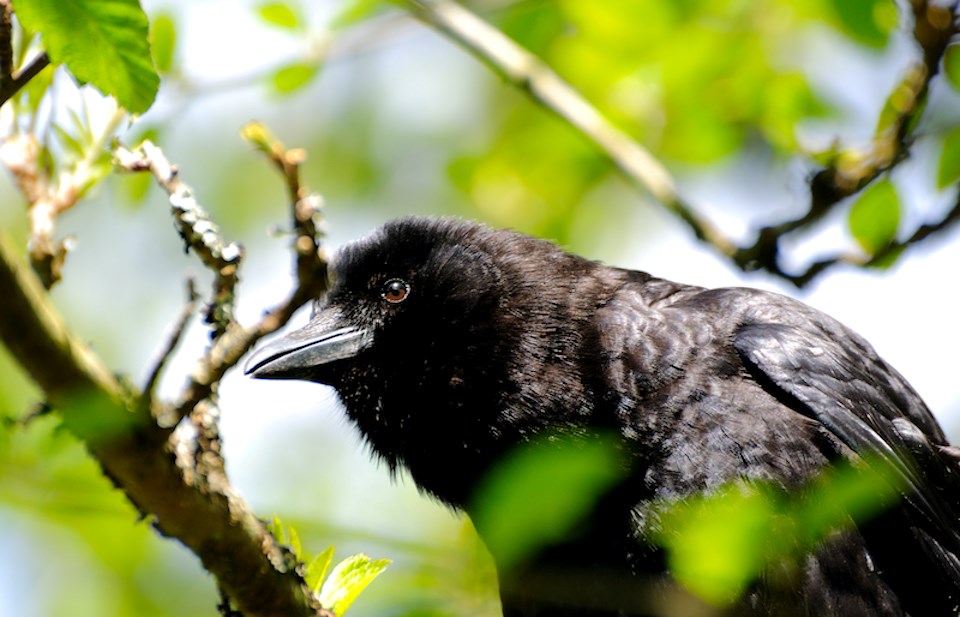Vancouver's landscape would look dramatically different without its resident crow population.
Known for their striking oil-black feathers, uncanny wit, and loud demonstrations, the dark birds thrive among humans in the densest urban environments.
While other fowl have been forced out of cities, crow populations have expanded with human development.
University of Washington professor Dr. John M. Marzluff has worked extensively with corvids in the Pacific Northwest, specializing in all things crow, raven, and jay.
Marzulff is interested in both how humans affect birds and how birds affect people. He has studied how humans impact bird populations through increased urbanization and how crows influence art and language.
When asked what differentiates crows in Metro Vancouver from ones south of the border, he says, "Not much."
Crows in the Pacific Northwest look and behave fairly similarly in big cities like Portland, Vancouver, and Seattle. However, there are several species of crows in North America, meaning crows in Tennessee will act and sound a little different than your resident cawer.
The crow native to the Pacific Northwest, the northwestern crow, lives west of the Rockies, extending south to places as far as Los Angeles. Other species include the American Crow and the fish crow.
Marzluff says crows have stronger populations in the Pacific Northwest and their relationship with people dates back through history. Indigenous peoples had a close relationship with corvids, recognizing their keen intelligence for thousands of years.
Why do nearly all of Vancouver's crows go to roost in Burnaby?
The city's resident crow population descends to Burnaby nightly once it starts to get dark, resulting in a wave of dark birds crossing the sky eastbound overhead.
However, crows don't function as an inseparable flock throughout all hours of the day.
Crows and ravens mate for life, although they will "remarry" if their partner dies. When paired up, crows tend to mate and raise their young and fiercely defend their territories (something most locals have likely heard in the springtime).
During this time, crows are known for enacting their famous "swoops" - a defensive behaviour used to ward off would-be predators from their nests. While they can harm humans, they aren't trying to "attack" them. Instead, they hope to deter folks from the area where fledglings are falling as they struggle with early flying attempts.
Locals typically only congregate for practical reasons, including food, roosting, and some socialization. They aren't exactly a "cohesive and integrated" flock, Marzluff notes.
Still, most crows in the Metro Vancouver area will stay loyal to the region. Similarly, most crows in Seattle won't make their way up north.
Burnaby sees thousands of crows fly from Vancouver nightly
The roosting area by Still Creek in Burnaby sees upwards of 10,000 crows nightly, affording its returning birds a safe place to sleep; one individual can alert the others of a potential threat. The birds disperse as the sun rises, venturing from the rookery to various locations in search of food.
Vancouver is also home to the Corvid family's largest member, the raven. These striking birds possess thick beaks and are about the size of a red-tailed hawk - one of the crow's top predators. They also have distinct voices and a whopping four-foot wing span. As such, ravens may also attack crows, by their sheer size, Marzluff explains.
But ravens don't appear often in Vancouver; a group of crows may attack a solitary individual. Also, ravens require more room for their territories.
Crows possess striking intellectual capacity, capable of facial recognition and multi-step puzzles.
Vancouver's beloved Canuck the Crow, who famously "stole" a knife from a local crime scene and befriended a human, was named the city's unofficial ambassador in CBC's 2018 public vote.
"Crows really seem to be paying attention to us," he comments. "The fact that they have been expanding greatly over the past 50 years, nears the growth in human population.
"By removing extensive forest we've made a mixture of habitats that is more suitable for crows. They are not a dense forest species.
"They have very big brains for their body size and they are well suited to live with us."



